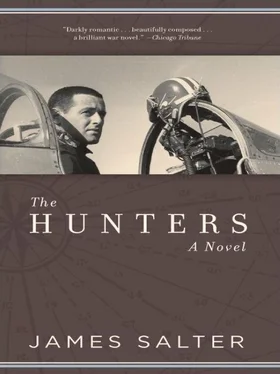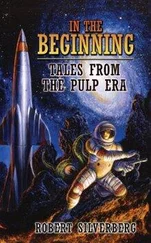“It’s not, eh?”
“I’m just trying to bring out that it could have been an honest mistake.”
“Honest?” DeLeo said. “He knew what he was doing.”
“We’ll see.”
They stood there for a while close to one of the flat, interior walls of the quonset, not talking. Pilots still thronged about the map-covered tables, explaining what they had done and seen, and the room was filled with voices. Cleve caught sight of Colonel Imil talking to Pell near the doorway. The colonel seemed happy. Pell must have been elated, too, but his expression was composed, a smile both modest and assured.
Hunter came by. He was brimming with words and excitement.
“You should have seen it,” he told DeLeo. “MIGs in front. MIGs in back. It was a circus.”
He turned to Cleve. “I still don’t know how we got away with it,” he said.
“You played it just right, Billy.”
“Oh, no,” Hunter cried. “You were the cool one in there. I was scared. I admit it. I was keeping my eye on the ones behind, though. I was trying to judge it just right. You know, the last second, like you said.”
“You were perfect. I mean it.”
“It worked out, didn’t it? Just right. We’ll get them again, too.”
“You bet we will, Billy.” Cleve was grinning.
For a time, everything was good. He was light, almost frivolous with satisfaction. He walked against the bitter wind, along roads frozen into stone, with a feeling that all of it was his dominion, bleak but his own. His name had some meaning. Moving among the others or alone, he was again and again conscious of victory. He had found himself. It was easy to laugh and nothing to smile. He hardly felt it wearing thin until suddenly it had happened, like an awakening after a night of love.
It was five days later that he sat listening to a mission in combat operations. Colonel Moncavage was leading it. Half an hour before, it had taken off in a dawn as calm as a sea of glass. Four of his flight were on it: DeLeo leading, Pettibone, Daughters number three, and Pell. The weather briefing beforehand had indicated it would be nothing more than a milk run. North Korea was heavily clouded over. In addition, they were flying to provide escort for a photo-reconnaissance ship, and those missions seldom developed into anything. Cleve stared through the window at the sky. He could see only small portions of it through the stratus decks. It was a dull, chilly morning, streaked with a grittiness that made all conversation seem stilted. His mind wandered to the thousand other places that life could have taken him to instead of this one.
He listened to the curt radio transmissions. The familiar ominous feeling that he could not quell grew within him. He wished he had gone himself. Nothing specific had caused it. That was the way he always felt. It was the old recurring apprehension. Whenever they went off without him, he was certain he had made a mistake. He could not be on every mission, however; it was a question of picking the right ones. But he sat nervously, for no reason that he could isolate, other than a deap-seated doubt.
It was like an alarm sounding when he heard them report the target area being relatively clear. No clouds. He should have known it. The damned forecaster was wrong half the time; if he said fair, it was likely to flood. The fear of having decided badly grew stronger. He waited uncomfortably. Now he was in for half an hour or more of sickening suspense.
He stood up and wandered about the room, trying to occupy himself. He looked over the maps on the walls again, the rows of charts, the claims board. The last he stood before for some time. On it was listed the name of every pilot in the group who had ever had a confirmed claim in Korea. Small red stars marked them. There were separate columns for aircraft destroyed, probably destroyed, and damaged, but it was only the first column that really counted. His eye moved down the trail of names. Many of them he did not recognize. They had left the group long before. Some belonged to dead men. There was Robey’s, with five stars after it. Nolan had three. Bengert, seven. Imil, six. Tonneson had thirteen, two full lines on the board. And there was his own name with one, and Pell’s. Cleve had seen men come in every day to glance at this board and admire their names on it. It was the roll of honor. Hunter had once told him that he would rather have his there than anything else in the world. It was absurd, and yet impressive. Anything that men would willingly die for had to be considered seriously. From this board, perhaps, or one like it, could come names a nation would seize in its appetite for heroes. For a truly singular record there might be lasting fame.
Abrupt voices interrupted his thoughts. They had seen something up north. Cleve moved quickly to the radio. He turned up the volume.
“…at twelve o’clock, Blue Lead,” somebody said.
“Roger, I have them.”
“Four more at ten high.”
It was garbled for a moment. They were all talking at once.
“They look like MIGs.”
“I don’t have them now.”
“One o‘clock! One o’clock!” someone called.
There was brief, unbearable silence. Then, “They’re MIGs! Drop tanks, Blue.”
The air filled with voices blocking one another out. He heard other flights cleaning up their airplanes and joining the fight. He had a sensation of drowning, of everything starting to go the wrong way. He felt a terrible impotence. The transmissions overlapped crazily It was difficult to follow what was happening, but somebody had gotten one. He heard a sharp call:
“He’s bailing out! There goes the chute!”
He sat quietly, overcome with depression. He tried to rationalize: it was over so little, like a child who has not been invited to a party, brooding. Nothing would help him, though. He listened in despair. The cries of those triumphant beat on him like waves of nausea.
Colonel Imil came in. He frequently dropped by to check on a mission’s progress if he was not flying himself.
“Hello, Cleve,” he said. “How’s it going up there?”
“Terrible.”
“What do you mean? What’s wrong?”
“Nothing. They’re in a fight.”
“A big one?”
“It’s hard to tell, Colonel. It sounds pretty big.”
“They get any?”
“One at least,” Cleve said. “Maybe more.”
“Nothing wrong with that.”
They sat listening together, but not much came over the air. The fight had already begun to dissipate. Like a storm, it was preceded and followed by incongruous calm. The colonel tried the volume control. It was full high.
“It must be over already,” he said. “Do you know who got them?”
“Couldn’t hear.”
“Who’s flying?” He walked over and read a scheduling board. He grunted. “Nobody much. Maybe Moncavage did some good. He’s got a chance with that line-up, anyway.”
“Maybe,” Cleve said. “My flight is up there.”
“Which is that? DeLeo?”
Cleve nodded.
“I can’t place him right off. He hasn’t done much, has he?”
“Not yet.”
“Is he any good?”
“If he gets the chance.”
“Well, we’ll see. Maybe this was it for him.”
“He’s due.”
Imil gestured toward the claims board.
“That’s what I judge by,” he said. “That’s where it shows. You talk about chances. Look at that, Tonneson for instance. Thirteen kills. That’s not like winning a lottery. Nobody can convince me that he just had thirteen chances while some other guy had none. What he did have was the urge to go a little farther than anybody else was willing to, maybe not thirteen times, but most of them. There it is, right on the board.”
“Yes. Of course, he was somewhat above average as a pilot, too.”
Читать дальше












